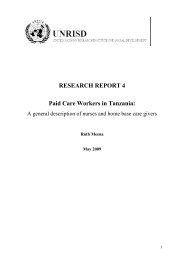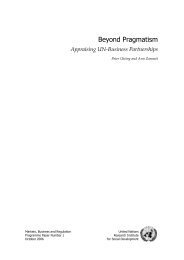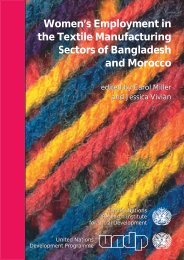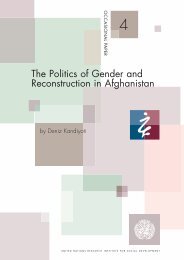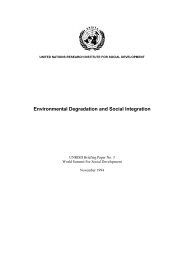communicating in the information society - United Nations Research ...
communicating in the information society - United Nations Research ...
communicating in the information society - United Nations Research ...
You also want an ePaper? Increase the reach of your titles
YUMPU automatically turns print PDFs into web optimized ePapers that Google loves.
What About Gender Issues <strong>in</strong> <strong>the</strong> Information Society?<br />
• if gender dimensions and consequences for all decisions are<br />
taken <strong>in</strong>to account, <strong>in</strong>clud<strong>in</strong>g those issues that are not obviously<br />
women’s issues (Malcom 1999).<br />
The Asian Women’s Resource Exchange (AWORC) was formed <strong>in</strong><br />
1998 to respond to <strong>the</strong> challenge posed by <strong>the</strong> need to access ICT<br />
knowledge and encourage women’s key participation <strong>in</strong> development<br />
policies. S<strong>in</strong>ce <strong>the</strong>n, AWORC has grown to be an active and energetic<br />
Internet-based network of women’s organizations and resource centres,<br />
develop<strong>in</strong>g co-operative approaches and partnerships to <strong>in</strong>crease access<br />
to, and applications of, new <strong>in</strong>formation and communication technologies<br />
for women’s social and economic development. In 1999, AWORC held <strong>the</strong><br />
first Asian Women’s Electronic Network Tra<strong>in</strong><strong>in</strong>g (WENT99) <strong>in</strong><br />
Sookmyung Women’s University <strong>in</strong> Korea. More regional workshops were<br />
held <strong>in</strong> <strong>the</strong> follow<strong>in</strong>g years and <strong>in</strong> 2002, WENT national workshops took<br />
place <strong>in</strong> Malaysia and <strong>the</strong> Philipp<strong>in</strong>es. WENT regional tra<strong>in</strong>ers have<br />
started to work with nationally based women’s organizations and ICT<br />
tra<strong>in</strong>ers to develop and run WENT-modelled tra<strong>in</strong><strong>in</strong>g workshops, which<br />
are designed to reach out to women and organizations <strong>in</strong>terested <strong>in</strong><br />
rais<strong>in</strong>g <strong>the</strong>ir capacity to use ICT for <strong>the</strong>ir social action and advocacy<br />
work. The workshops also aim to enhance women’s tra<strong>in</strong><strong>in</strong>g skills and<br />
<strong>the</strong>ir capacity to develop and run ICT tra<strong>in</strong><strong>in</strong>g for nationally based<br />
and/or community-based ICT tra<strong>in</strong><strong>in</strong>g for women and <strong>the</strong>ir organizations.<br />
A similar event took place <strong>in</strong> Africa for <strong>the</strong> first time, with a<br />
WENT workshop organized by <strong>the</strong> Association for Progressive<br />
Communications (APC) Africa-Women <strong>in</strong> Cape Town, South Africa, <strong>in</strong><br />
April 2003. Participants and tra<strong>in</strong>ers worked toge<strong>the</strong>r to share skills,<br />
and discuss gender and ICT policy issues. Networks such as AWORC and<br />
APC Africa-Women, equipped with work<strong>in</strong>g experience as well as a<br />
<strong>the</strong>oretical understand<strong>in</strong>g of women and ICT, are ready to participate <strong>in</strong><br />
<strong>the</strong> ICT policy development to ensure that <strong>the</strong>se policies fully adhere to<br />
<strong>the</strong> needs and realities of women (C<strong>in</strong>co and Garcia 2000).<br />
Karat, a coalition of women’s NGOs <strong>in</strong> Central and Eastern Europe<br />
(CEE), is lead<strong>in</strong>g an ICT project to better understand women’s economic<br />
rights and <strong>the</strong> impact of economics, employment and social policies on<br />
women. The project aims to produce <strong>in</strong>formation and <strong>in</strong>itiate debates on<br />
women’s economic rights and <strong>the</strong> gender impact of policies to improve<br />
gender standards, and <strong>the</strong>ir implementation <strong>in</strong> <strong>the</strong> CEE. Karat members<br />
say that, while <strong>the</strong> enlargement of <strong>the</strong> European Union has been gett<strong>in</strong>g<br />
a lot of coverage <strong>in</strong> <strong>the</strong> CEE media, <strong>the</strong>re has been little civil <strong>society</strong><br />
<strong>in</strong>formation and understand<strong>in</strong>g of <strong>the</strong> enlargement process, little citizen<br />
<strong>in</strong>volvement, and no organized women’s participation to address women’s<br />
rights and gender <strong>in</strong>tegration. They believe that CEE women’s groups<br />
need to become more active <strong>in</strong> address<strong>in</strong>g women’s rights <strong>in</strong> <strong>the</strong> context<br />
of European <strong>in</strong>tegration, and that <strong>the</strong>re is a strategic opportunity for<br />
25




